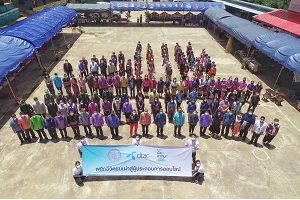Social Development and Human Security Ministry, dtac to give digital skills training to indigenous people

18 August, 2022 – Social Development and Human Security Ministry and dtac signed a memorandum of understanding (MoU), forming a partnership to empower the indigenous peoples through digital and entrepreneurial training, with the aim to increase economic well-being and promote sustainable tourism. The pivotal partnership will primarily focus on 24 villages covering seven ethnic minority groups with outstanding products and will expand to cover 20 groups of indigenous peoples in three years.

According to data from the United Nations, 47% of all indigenous peoples globally in employment have no education, compared to 17% of their non-indigenous counterparts. This gap is even wider for women. In addition, more than 86% of indigenous peoples globally work in the informal economy, compared to 66% for their non-indigenous counterparts. Indigenous peoples are nearly three times as likely to be living in extreme poverty compared to their non-indigenous counterparts.
The estimated indigenous population in Thailand is around six million people, covering 70 ethnic groups across the nation and with the majority living in mountain townships of northern and southern Thailand.
Anukul Peedkaew, director-general, department of social development and welfare, says the government is promoting a strategic policy focusing on human development through “soft power” under Thailand 4.0 plan, creating high economic value through the unique culture and traditions of indigenous peoples who are often margin alised and left vulnerable. Those living in 24 villages at higher elevations in the mountains of Thailand – Chiang Rai, Chiang Mai, Mae Hong Son, Lamphun, Uthai Thani, Nan and Payao – will be provided knowledge and training programs through our partnership with dtac and its Net-for-Living team, offering them more career opportunities as online entrepreneurs.
alised and left vulnerable. Those living in 24 villages at higher elevations in the mountains of Thailand – Chiang Rai, Chiang Mai, Mae Hong Son, Lamphun, Uthai Thani, Nan and Payao – will be provided knowledge and training programs through our partnership with dtac and its Net-for-Living team, offering them more career opportunities as online entrepreneurs.
Our partnership with dtac will help indigenous peoples promote their products in the online market, thus expanding their potential market regionally, nationally and even internationally. Through our partnership, dtac’s Net-for-Living team will provide digital skills to indigenous peoples with the aim to raise their incomes by 50%, while the department will provide knowledge on business management, accounting, product development and FDA registration. This initiative is a critical part of the department’s efforts to create opportunities and address inequality.
Stephen James Helwig, interim chief corporate affairs officer of dtac states “dtac’s business operation is based on human rights, particularly in terms of promoting equality without any discrimination, whether it is race, gender, or nationality. Mobile operators play an important role to connect all parts of society with the digital economy, which will help create jobs, income and better quality of life from mobile technology. Our collaboration with the Department of Social Development and Welfare illustrates our efforts to reduce the digital divide among indigenous peoples through dtac’s ‘Net-for-Living’ program. This project will equip them with digital entrepreneurial and marketing skills, together with a plan from the Department of Social Development and Welfare focusing on advancing their economic potential, leading to grassroots economics development and a sustainable economic recovery for their regions. So far, dtac’s Net-for-Living program has proven its success by raising participants’ income by 40-50%, allowing those living in vulnerable conditions to step into new frontiers and opportunities in work with confidence. In addition, dtac also has a “train the trainer” program, specifically designed for indigenous peoples to further facilitate knowledge transfer and experience sharing.
with digital entrepreneurial and marketing skills, together with a plan from the Department of Social Development and Welfare focusing on advancing their economic potential, leading to grassroots economics development and a sustainable economic recovery for their regions. So far, dtac’s Net-for-Living program has proven its success by raising participants’ income by 40-50%, allowing those living in vulnerable conditions to step into new frontiers and opportunities in work with confidence. In addition, dtac also has a “train the trainer” program, specifically designed for indigenous peoples to further facilitate knowledge transfer and experience sharing.
Through this initiative, dtac’s immediate goals are to increase income per head by 15-20% after completing training in 6 months, with further gains to follow. The participants are expected to boost their digital skills through self-evaluation, with a corresponding improvement in their financial skills, such as debt reduction, savings growth and access to funding.
Monetising the uniqueness of indigenous peoples
Lapawan “Nee” Semu, a resident of Aka tribe in Chiangrai, says she previously had no idea how to start an online business. She rode a motorbike alone 30 kilometers from Doi Mae Salong to join the program. And she now gained more knowledge about online platforms and live commerce, resulting in better sales, especially for clothing, after joinin g the department’s and dtac’s Net-for-Living program.
g the department’s and dtac’s Net-for-Living program.
Sophon “Joy” Sae-Lee, a resident of Karen community in Chiangrai, says her understanding of online commerce will help him and more than 40 villagers survive after going through the huge economic impact on the tourism industry from travel restrictions during the past few years of Covid-19 pandemic. His village produces and sells silverware and accessories. Selling products online will create new revenue streams and expand the customer base.
The collaboration in strengthening the capacity of indigenous peoples towards entrepreneurship will address rising contemporary challenges by combining digital technology with traditional ways of life, creating economic values based on their unique cultures and potentials in line with the government policy in ending poverty and inequality.
Comment on this article below or via Twitter @IoTGN
